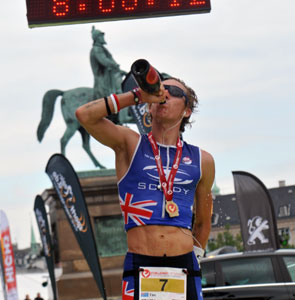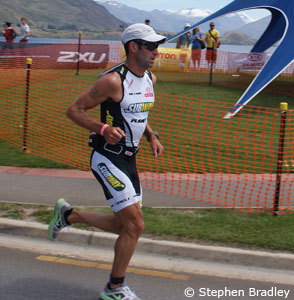A chat with Keegan Williams
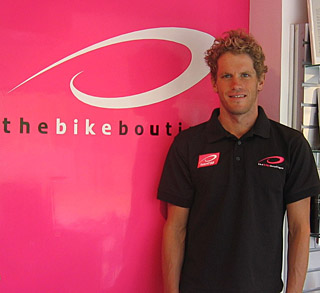
Keegan Williams was born 30 years ago in Hamilton, New Zealand and has been a pro for just two years. But in that time he shows much promise, highlighted by a second place finish against a strong European field at the Iron-distance Challenge Copenhagen in a sterling time of 8 hours 12 minutes. To back that up, he also posted a third at Challenge Wanaka, and fourth places at Ironman New Zealand and the full distance Rev3 at Cedar Point.
Perhaps the best sign he might yet follow in the footsteps of legendary New Zealand Ironman Cameron Brown was his marathon at Copenhagen – a world class 2:46 – accompanied by a well balanced 51 minute swim and 4:32 bike.
A recent switch to the demanding coach Brett Sutton’s Team TBB seems to have been a good match, perhaps aided by the strong work ethic Williams brings to the table from a childhood spent working hard on his parents’ dairy farm.
He may have gotten a push towards a career as a full-time professional triathlete when he got laid off from his structural engineering job a few weeks before Challenge Copenhagen – and three months before his planned wedding.
Slowtwitch: Tell us about your parents and their parents — their jobs, their education, their experience in sport.
Keegan Williams My grandparents were very active. Granddad was a very good tennis player and grandma enjoyed tramping and the outdoors.
My mum is Maree Williams and she is a registered nurse and was brought up on a dairy farm in Piriongia, Waiakato. My dad Owen Williams has had an interesting life, and you could write a book with his adventures and experiences. He was born and grew up in working class Liverpool, near where the Beatles were from. He left high school at 17 and started traveling in South Africa, went through over 40 countries and ended up in New Zealand as a 21-year-old.
So his education was less than formal, but he picked up several languages such as Spanish, Portuguese and Zulu when working and mixing with various cultures. He then met my mother, tried dairy farming on my grandparents’ farm and has been involved in the dairy industry ever since.
Dad was a keen soccer player, and used to coach the local Morrinsville senior team. To strengthen the team, he used to import farm workers from the UK that could play to work on our farm and surrounding ones, so we always had seasonal workers from the UK which was a lot of fun for us kids.
For the past 10 years he has worked in South America, setting up and managing dairy farms using New Zealand-style management systems. He is currently in central Brazil as project manager and partner in a large pasture-based milk production farm.
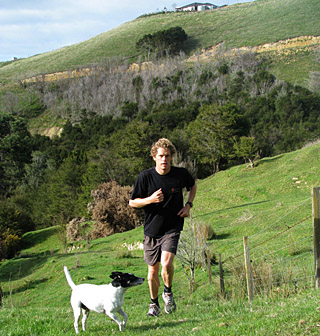
ST: What values did your parents instill in you?
Keegan: They taught all us kids a really good work ethic. Growing up on a farm was a great way to see what real work was — our parents got up at 5 am every single morning, and did not finish until 6 pm each night. No weekends off unless they could afford and find a reliable relief milker. We always had a time sheet on the fridge and there was always plenty of work to do if we wanted to earn money. Milking, feeding calves, chopping thistles, cleaning troughs etc. I remember saving for my first real road bike for a long time! My brother and I would ride to the local bike race, race, ride home and have about 5 minutes rest to refuel, then it would be time to go and get the cows in for milking. It was tiring but you definitely learnt the value of money and hard work. We quite often didn’t have motorbikes on the farm, and used mountain bikes to get around, so I was training before I even knew it.
ST: Tell us about your brother and sisters.
Keegan: I have a twin brother Bevan, an older brother Emlyn and a younger sister Morwenna. Bevan raced in Belgium for a year with a semi-pro cycling team and has done a couple of Ironmans all around or under 10 hours. He is currently working in Uruguay on a farm owned by a couple of New Zealanders, so he definitely caught the travel/work overseas bug from my dad.
My older brother Emlyn is an electrical engineer for Siemens and works in Qatar in the Middle East. He and his wife have also caught the triathlon bug and two years ago bought some bikes in October, trained for Ironman New Zealand, got married, then a week later did IMNZ together while on their honeymoon.
Emlyn dipped under the 10 hour mark and Helen was just under 11 hours, with some help from my coaching. They also just did Challenge Copenhagen. Emlyn went 9 hours 20 minutes and Helen did 10 hours 55 minutes – just 6 months after giving birth to their first child, Heath! Definitely a role model for what can be done if you really want it.
My sister Morwenna is a couple of years younger than me and works as a travel agent which comes in handy when organizing trips and extra luggage allowances! She plays soccer both indoor and outdoor throughout the year.
ST: Where did you grow up? What was it like?
Keegan: I grew up on a dairy farm about 15 kilometers from a town of 7,000 people called Morrinsville. We lived down a no-exit metal road (not good when we started riding bikes). Growing up, my brothers and I were always outside, either playing or helping mum and dad with the farm work. It was a great place to grow up. Once we started riding bikes, our neighbors ended up getting interested in it also. Out of the 5 farms down our road, 4 of the families had people riding bikes.
We were a little sheltered growing up there, though, as the local school we went to only had approximately 100 kids ranging from 5 to 12 years. I remember starting high school in town with approximately 1,200 teenagers and thinking, I have never seen this many girls in my life! I still often ride through the area we grew up, and it always brings back good memories.
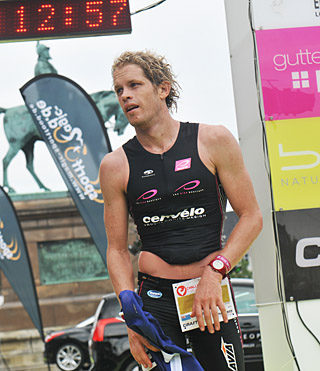
ST: What were your earliest sports? Which of them were you most passionate about?
Keegan: I was very passionate about soccer growing up, and I vividly remember wanting to be a professional player from the ages of 10 to 13. I played for the Morrinsville soccer club, with dad as the coach some of time, and both my brothers on the same team. We had a very good team and if I remember correctly, we only lost about 2-3 games in the two years I played for them. I played striker, Bevan in midfield, and Emlyn was the goalie. Bevan and I also played representative soccer for Waikato for two years.
We then started riding bikes at about the age of 13. The local Morrinsville cycling club was very strong, and they let you borrow bikes to try it out and see if you liked it, which we did. Julian Dean, professional cyclist for Garmin-Transitions, also came out of the Morrinsville cycling club.
ST: What sports did you do late in high school and college?
Keegan: I played soccer from the ages 11 to 15, and cycled from 13 to 17. I was never really any good at the cycling — my twin brother was always a lot better. I really struggled with the top end and accelerations you get with bike racing. Even today, the longer the race, the better for me, I only seem to get going after about 5 hours of racing. We also had swimming lessons while at primary school (ages 10 to 12). We had lessons up until the teachers said you need to join a club if you want to do any more. I then started to do some Olympic distance triathlons while at university from 1999 through 2002.
ST: What did you study at university?
Keegan: I studied Civil Engineering at Canterbury University in Christchurch. My degree is a Bachelor of Engineering with Honours in Civil Engineering.
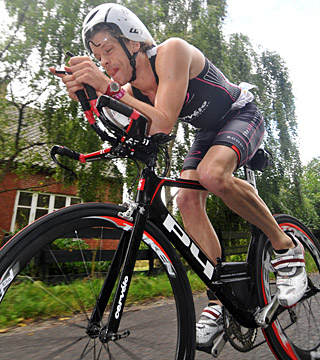
ST: Who were your earliest and present sports heroes?
Keegan: The earliest sporting hero I can remember is Ian Rush, the Liverpool striker. Probably the only reason I liked him is he scored lots of goals and played for Liverpool! I can also remember being inspired by Gary Anderson at the Barcelona Olympics. He got a bronze in the individual pursuit. Chris Boardman won on his Lotus superbike, and that was my first introduction to a really nice bike.
Recently, I have been really inspired by New Zealand’s great past runners, the guys from the [famed running coach Arthur] Lydiard stable, guys from the 50’s and 60’s Bill Ballie, Jeff Julian, Barry Magee, Peter Snell, Murray Hallberg and Ray Puckett — the list goes on and on. I can really relate to Lydiard’s men. Those guys were tough, trained hard and raced hard. They all worked and had to fit in their training and racing with everyday life. Guys like Bill Ballie, who weren’t natural athletes but trained themselves very hard to get to their best.
I have been reading all the old books, and love hearing the epic training and racing stories. For example, John Davies (Olympic bronze 1500 meters) tells of completing an exhausting 22-mile Sunday morning run over the very hilly Waitakeres and seeing Jeff Julian setting off for the return journey – the other way, to prevent boredom!
ST: And what about Kiwi triathletes: Erin Baker, Hamish Carter, Bevan Docherty, Terenzo Bozzone, Cameron Brown, Bryan Rhodes, Joanna Lawn, Sam Warriner, Gina Ferguson, Andrea Hewitt… ?
Keegan: Obviously Cameron Brown is the benchmark in New Zealand. He is a definite role model — down to earth, humble, and races like an animal. He trains hard and gets the job done, time and time again. Hopefully he can race to his potential in Hawaii again this year [Brown was off his best – 17th in 8:34:10], as people outside New Zealand probably don’t realize how good he is.
ST: Who might have been your heroes or role models outside of sports?
Keegan: My biggest role models growing up were definitely my parents and my grandparents. My grandparents were humble, honest and supportive of what we wanted to do.
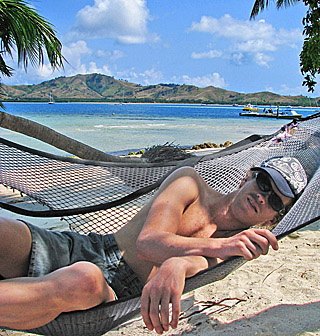
ST: What scrapes or interesting predicaments did you get into as a child?
Keegan: This is quite embarrassing, but at primary school I told the principal that his teaching wasn’t up to scratch, the comment didn’t go down very well at all! My older brother had just gone to high school and must have come home and put some ideas in my head that high school was so different, and I would be going from a school with 10 people my own age and 100 in total to a high school of 1300.
ST: Any injuries or serious illnesses growing up?
Keegan: When I was trying to train and compete while at university I had real problems getting sick and injured all the time. This was probably due to the fact that the degree program I did was fairly intense, the university lifestyle, and not really understanding the need to rest after a night out! At that time, I only had to look at my running shoes and my legs would be sore.
ST: What was the specific injury?
Keegan: I had compartment syndrome in all four compartments in my calf muscles, which I had released with operations while at university. By the end of university, I was pretty fed up with not getting to where I thought I should be, so I stopped doing any real exercise from 2003 to 2006. I surfed a little, traveled and worked in Europe and had a good time. When I got home in 2006 I started to do some running and found that my body didn’t seem to be getting sore and injured, so I decided I would give Ironman New Zealand a crack.
ST: What led you to triathlon?
Keegan: Often, my dad would go for runs to keep fit for soccer, and he would take us kids on our bikes. I think he soon realized we quite enjoyed that, so the next step was to take us to race. We always seemed to do stuff together, so a team triathlon was ideal and he entered us kids as a team. When I started university I was bored of the cycling, and thought I would try some triathlons, as I knew I could run a little from soccer and had done some swim lessons so wasn’t a complete brick in the water.
ST: What was your first triathlon like?
Keegan: My dad took me and my brothers to a team triathlon, where I think I did the run section. I remember running next to all these adults and thinking this is pretty fun. The swim was held last as it was in the local swimming pool. I have no idea how we did, but think we won a spot prize, so that was great fun.
ST: What was your first triathlon success which gave you the notion that you could compete with the best and make a living at it?
Keegan: I did Challenge Wanaka in 2008 and ended up 5th and wasn’t too far behind the leaders. I knew then that I could possibly make it in the sport. I am still in the process of making a living at it, as I still work part time as structural engineer, but I am hoping in the near future to dedicate myself full time to training and racing.
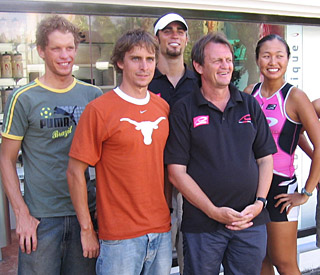
ST: Who was your first triathlon coach and what did he teach you?
Keegan: Walter Thorburn (who held the course record at the New Zealand’s premier Half Ironman at Tauranga for 10 years). I still remember getting my first program from Walter and when I looked at it I saw it had no days off. I was quite shocked and wondered, What was this all about? I had done some cycling and I was used to having Mondays and Fridays off and not training every day. Walter was still competing at the highest level, and since I was at University at the time, we did quite a lot of training together. He is a very hard worker and diligent trainer, so to see his work ethic was good for me. I remember one time — and this is typical Walter — I punctured, and instead stopping to talk while I fixed it, he cycled up and down the road until I finished
ST: What led you to Brett Sutton and Team TBB?
Keegan: After Challenge Wanaka in 2008, I knew I had to get a coach who could show me what was needed. I had trained myself up until then for my first half Ironman and Ironman. I had a look around and Brett seemed like the best coach out there, so I thought to myself, if he can’t help me get fast, no one can. So after contacting him, he said I could come to the Philippines and he would have a look at me, and if I suited he would give me a shot with Team TBB. So off I went to the Philippines for a tryout with a group of about 7 athletes.
ST: How tough are his camps?
Keegan: My first time in the Philippines was really tough, as I came out of a New Zealand winter and I was training the way I normally did before I left. The heat was quite unbearable to start with. I remember my first run lasted about 15 minutes before I was drenched and slowed to a walk. And then the training was quite different to what I was used to. Every time we would go to the track I would dread it, as it was always a real suffer fest for me.
Since then I have done another camp in the Philippines and one in Leysin, Switzerland. The past two camps were not as tough as the first one, probably because the first one he had to push and prod you to find out your limits and weaknesses. The first few weeks in Switzerland were also quite hard to adjust, as it was my first time at altitude. The swimming was rough and you have to forget about your times from sea level.
And when out riding we had a 15 kilometer mountain climb home after every ride and after every run session on the track which is located at the base of a valley. After the run sessions it was quite funny to watch, as sometimes it would be an hour or more before people would leave to ride home, just trying to delay the hurt for a little bit.
This past year I haven’t been to any camps, and have been based at home. This was a decision made by Brett based on my personality and training needs, and it has worked well.
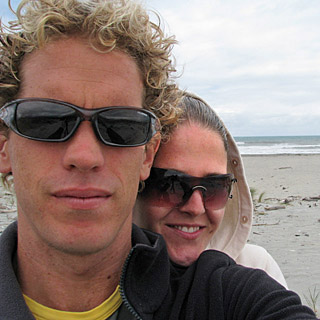
ST: Tell us some of the ways he has dealt with you personally?
Keegan: He is a master motivator. Yes, the Doc is definitely a doctor in psychology. That’s probably one of his strongest traits, he doesn’t treat everyone the same but knows how to push the buttons of the different personality types — and when to do it. I wish I could provide a tape recording of some of his stories, as they are always very good. After a certain poor performance I got an email which was very good, and I will share a few sentences from it. This is not a typical email but was a good wakeup call for me at the time, reminding me of what needed to be done:
“Person to person, I don’t give a $*# if you don’t handle the heat. You were warned and warned and you succumbed. That means not much thought went into your dilemma. So, if you were an Anzac fighting in a trench you are now dead. Because you failed to improvise and overcome.”
ST: Many detractors say Sutton works everybody crazy hard and they all get injured after a brief period of success. What is the truth in your experience?
Keegan: Ironman is a sport which basically goes to the hardest/smartest worker. I would say there are actually fewer injuries with Brett than other coaches, as he is very protective and knows when to back off. For example, he hates his athletes trail running, as it might be soft on the legs, but the amount of sprained ankles far outweighs the benefits.
ST: How has he either led you to injury or protected you from injury through personal observation and coaching?
Keegan: Last year my body was really tired after a heat camp in the Philippines and an altitude camp in Leysin, Switzerland. I had raced Ironman Switzerland, Ironman UK and Embrunman with very lackluster results. After Embrunman, I really wanted to go to Challenge Barcelona and try and salvage a good race in Europe, but he sat me down and told me to go home and have a rest. This was definitely the best option and this season has been a marked improvement. If I had my own way I probably would have dug the hole I was in a whole lot deeper.
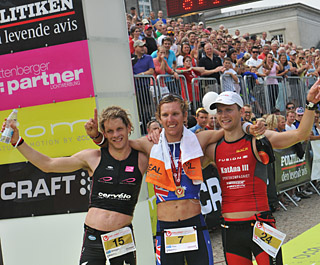
ST: How did you meet that fabulous and beautiful woman you were with in Copenhagen? What does she think of your sport?
Keegan: I met Tracy when having a big Kiwi night out in a local bar, and 8 years later we are still together. Tracy works as an accountant for a firm specializing in farming accounts and practices. She loves the sport most of the time, and enjoys getting to go to new places such as Copenhagen. The only bit she doesn’t like is when I am tired and cranky from training!!
ST: What are some of your favorite books, movies, foods and places?
Keegan: I love reading any of Lydiard’s books and autobiographies of New Zealand past athletes. Movies, I like a good comedy like Step Brothers I love to eat roast chicken, bananas and mangos. My favorite places are home, Wanaka- the site of Challenge Wanaka, and Raglan – New Zealand’s best surf break, about one hour drive from home.
ST: What is your big end of season target race?
Keegan: My big event at the end of the year is getting married on the November the 20th. I have two close friends also getting married in November so it’s a busy month! The local Kiwi season kicks off at the start of December with a Half Ironman. So I am having a little break now, then back into training for that
ST: What is your long term goal as a triathlete?
Keegan: As any other Kiwi triathlete I really want to win Ironman New Zealand. Once that box is ticked I will go on to the next big goal.
ST: One of your most embarrassing moments?
Keegan: Crashing the tractor into the dairy shed when I was 12. With two brothers you never get to forget that.
ST: What is the most overrated virtue?
Keegan: Tough question, I will say cleanliness, people in the dark ages didn’t shower every day and got along fine… PS. I do shower every day


